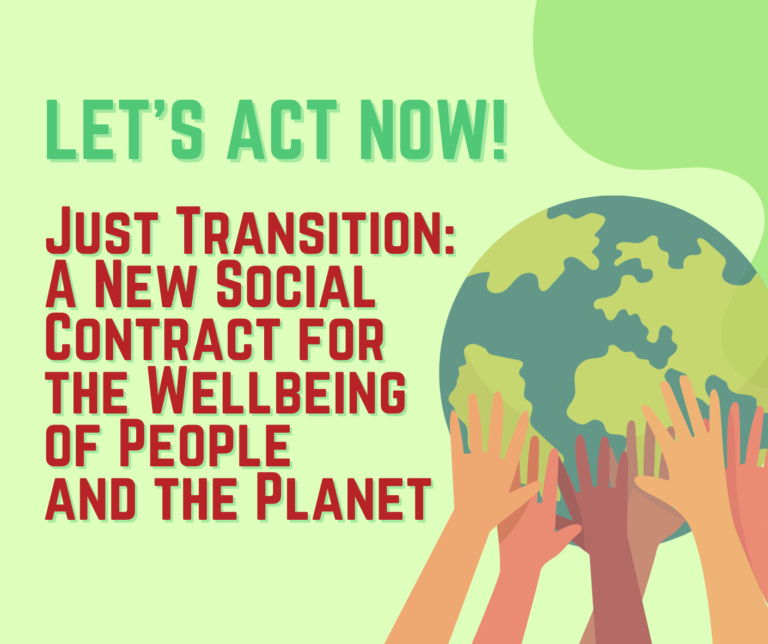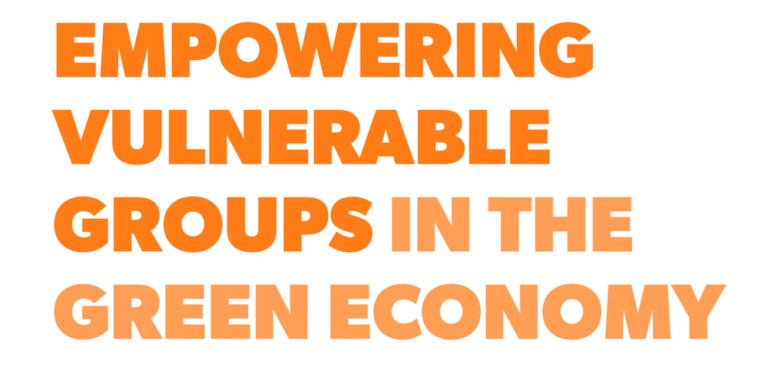An EU policy framework for a just transition as a blueprint for social and economic transformation
In December 2023, the European Economic and Social Committee (EESC) adopted the Exploratory Opinion “Advancing the EU’s just transition policy framework: what measures are necessary” at the request of the Belgian Presidency of the Council of the EU, whose priorities include the promotion of a just transition. SOLIDAR welcomes this Opinion and urges policymakers to use it as a blueprint for the social and economic transformation of our time.
The Green Deal’s just transition policies are still too fragmented
A Eurobarometer survey published in 2022 found that the majority of Europeans – almost nine out of ten respondents (88%) – agree that the green transition should not leave anyone behind and that most (77%) feel a personal responsibility to act. However, only half of Europeans agree that the EU is doing enough to ensure that the green transition is fair and just.
So far, measures to address the negative consequences of climate action and inaction have been treated as fragmented add-ons to EU climate and environmental policies, rather than addressing these issues in a comprehensive way. Recent geopolitical shifts, combined with social unrest such as the farmers’ protests spreading across Europe, the cost-of-living crisis and increasing poverty, add urgency to the picture.
Given the climate emergency and the need to reconcile the environmental, economic and social dimensions of climate policy, a strong and bold policy framework for a just transition is needed. SOLIDAR welcomes the EESC Opinion on a just transition policy framework, to which our network contributed significantly during the drafting process, and its positive tone highlighting the benefits and opportunities of the green transition.
A just transition policy framework based on six pillars
Overall, SOLIDAR endorses the six key pillars of a just transition policy framework and the more than 70 concrete policy recommendations set out in the Opinion:
- Adopt a holistic, cross-sectoral and coherent approach to policy-making for a just transition based on the principles of environmental sustainability, the right to a decent life and the protection of social values. This can be done, inter alia, by establishing an EU Just Transition Observatory and introducing a social dimension to the work of Climate Observatories, adopting a whole-of-government approach in the institutions, and appointing a Commissioner for the Just Transition and a permanent rapporteur on a just transition in the European Parliament.
- Promote a sustainable economy that delivers prosperity for all within planetary boundaries. This means designing and implementing a strategy that paves the way for a rapid phase-out of the fossil economy and the sustainable management of resources, and a Green and Social Deal that anticipates, plans and implements the green transition in a way that maximises its economic and social benefits, while ensuring that the required contributions are fairly shared across society. Actions include strengthening the implementation of the environmental and social dimensions of the European Semester and developing strong national strategies to create a favourable environment for the social economy.
- Strengthen the European social model to safeguard the wellbeing of workers, people in vulnerable situations and marginalised communities who are increasingly affected by climate change, and to support them through the process of economic transformation. This can be done, for example, by adopting a European Directive for a Just Transition of the world of work; addressing skills shortages for critical sectors and ensuring that learning, up-skilling, reskilling schemes are accessible to all; encouraging Member States to update their welfare systems to ensure that the benefits of the green transition are shared equitably and to guarantee high quality, affordable and accessible services of general interest; and carrying out impact assessments and independent research to improve knowledge of the opportunities and challenges of the green transition.
- Ensure social dialogue and collective bargaining, civil dialogue and the involvement of regional and local authorities in decision-making on just transition, including through support from relevant funding mechanisms. Encourage the development of short and long-term plans for a just transition at company level, of national and regional just transition plans, and of just transition agreements at territorial level to revitalise affected areas, always with the meaningful involvement of relevant stakeholders.
- Enable enterprises to play their part in ensuring a just transition that is people-centred, responsive to local conditions, respects nature and the environment and seizes opportunities. Develop roadmaps for sectors and companies to decarbonise in line with the ‘Fit for 55’ legislation and the 2040 climate goal, and provide public support for a significant upscaling of social economy enterprises and organisations, as well as community-led initiatives focused on social goals and equitable environmental protection.
- Mobilise adequate public and private investment in a just transition, starting with setting up an EU financing strategy for a just transition along the lines of the ground-breaking Next Generation EU, aligning the implementation of State aid and public procurement rules with just transition objectives, and setting in motion an EU common taxation agenda to raise the resources needed for the ecological transition and reduce wealth inequality.
A just transition framework should go global
While it is crucial to address just transition within the EU, it’s equally important to consider its external impact. SOLIDAR regrets the lack of proposals for external action in the EESC Opinion and calls on the EU to implement a global just transition strategy in its relations with partner countries, which would ensure policy coherence, accelerate the achievement of the 17 Sustainable Development Goals and the Paris Agreement objectives and at the same time provide incentives for partner countries to move in this direction. SOLIDAR also proposes a stronger link between the EU’s just transition policy framework and the UN Just Transition Work Programme. At national level, we urge Member States to devise and implement policy packages that address the relevant employment and social aspects linked to the transition in a comprehensive manner, in line with the Council Recommendation on a fair transition to climate neutrality from June 2022.
Joining forces to turn such a framework into reality
A just transition must be at the centre of the next EU political agenda and the development and implementation of an EU policy framework for a just transition must be a priority for policy-makers. At this crucial time of elections and institutional renewal, SOLIDAR calls on all stakeholders to join forces to make this framework a reality and to use the EESC opinion as a blueprint to ensure that the transition to a sustainable future is not only ambitious, but also just and inclusive.




